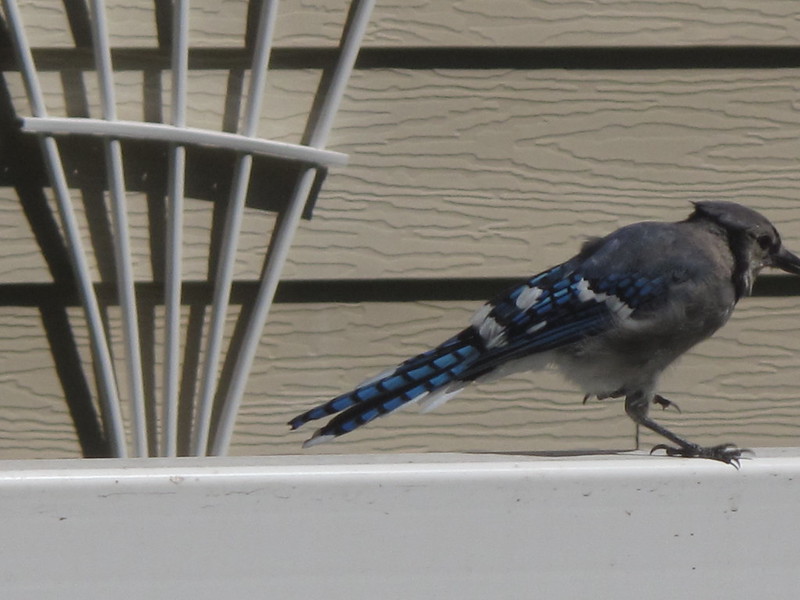So it’s been a couple of days.
They’ve been good days, mostly, and in fact quite remarkable by the poor standard that the rest of August had already set.
My back seems to be doing a lot better, in that there aren’t terrible twinges of pain every time I bend or move in the wrong way. Or, sometimes, in any way. That’s actually the worst part about having a bad back: is this the perfectly ordinary movement that’s going to cripple me for days or weeks? (Well, the worst part if you discount the pain itself.) My back is a lot better when I sit than when I stand, which is actually the exact opposite of how it was when I was first diagnosed with a herniated disc, when standing seemed to relieve it more than anything else. (I’d find reasons to work standing up, when I could, and I’d frequently not take a seat on the train.) This is probably better, since it’s usually easier to find somewhere to sit (or make excuses for having to do so) than needing to stand all the time, but it’s a little weird. And it does still kind of hurt when I’m standing. Not nearly so much that I can’t — or would prefer not to — move, but enough to make me cautious and I’m sure occasionally a little irritable. I don’t know if it’s getting better, or if this is as better as it’s going to get, but this is much, much better than it’s been for the past couple of weeks, and so I’ll take that.
And honestly, there are people who have it a lot worse than I do.
My parents spent most of Friday and Saturday away, visiting my mom’s brother in Connecticut, who isn’t doing very well. All of her brothers and sisters made the trip, and I spend the time at home looking after the dog.
Some things I did, in no particular order:
I read a couple of books. On Friday, I finished listening to David Mitchell’s Back Story and reading Arthur C. Clarke’s Rendezvous With Rama. I think the former was probably better than the latter. What Mitchell may lack in a hugely exciting biography — he grew up fairly normal, went to school, became a comedic actor, and now does that for a living — but he tells that story well and amusingly, and I particularly enjoyed hearing it in his own voice on the audio book.
Meanwhile, I like Clarke, or at least I remember a great fondness for him when, as a young teen, I discovered the Space Odyssey series. I don’t remember if the books or Kubrick’s movie came first for me, but there’s more humanity in Clarke’s writing, more warmth and humor, and I quite enjoyed reading the books, even if I never went as far as the fourth and final volume in the series.
(3001 came out in 1997, and I have a dim recollection of it getting some bad commentary at the Penn State Science Fiction Society, which I was part of at the time…and which I discovered on Friday, quite sadly, appears to have disbanded. Or maybe I should say re-discovered, since this is apparently something I learned of back in 2007. I have a comment on that post and everything, so it’s not like I didn’t know. I was actually more distressed to learn that the Monty Python Society, of which I was a long-time member and two-time president, has probably also disbanded. With only a few exceptions, I sadly haven’t kept in touch with most of the people I knew through the club, but I’m saddened by the idea that it might be gone forever. There’s apparently a Harry Potter fan club on campus that’s taken up a lot of the slack of both clubs — inheriting the science fiction library, putting on sketch comedy for Red Nose Days — but it’s just not the same.)
Anyway, back to Rama. While I like Clarke — his short story “The Nine Billion Names of God” remains a favorite — I was a little surprised to discover this one both the Hugo and Nebula when it was published. I haven’t read any of the other nominees from the same year, but Rama is…well, kind of boring. Very little actually happens, and maybe that’s in part by design, and maybe that’s why Gentry Lee (who continued writing a number of sequels) apparently introduced a lot of new characters and plot, but it feels much more like a short story padded out to novel length. It’s never exactly unenjoyable — I was worried it would be risibly dated, remembering cosmonauts in 2061 — but that wasn’t ultimately a huge concern. There just wasn’t enough to the book. There’s a huge central mystery — and this is maybe a bit of a spoiler — and it’s one that never gets solved. Along the way a few other things happen, although the stakes never feel terribly high, but not nearly enough.
On Saturday, I finished reading Voltaire’s Calligrapher by Pablo De Santis. I hope to say more about it in the near future, since it’s an interesting book, but for now let me just say that when you pick books out of the local library based almost exclusively on their short length, you may wind up with some weird choices.
On Friday evening, I finished watching the last two episodes of the British crime drama Broadchurch. I could probably say a lot more about it than I’m gong to now — it’s late, but I also know some people who are not yet caught up with watching it — but let me just say I’m a bit torn, and my feelings about the finale in particular are hugely split. Is it possible to find something both completely compelling and effective and also a letdown?
On Saturday, while the neighbors partied and karaoked, I watched Lincoln. I’ve had it out from Netflix for a while, unable to watch it until my new computer (with its working Blu-Ray drive) arrived. It’s not a perfect movie, maybe a little too pat and certainly not a full biography of the man, but it’s quite entertaining, moves at fast clips, and the performances are terrific.
And today, I went to see The World’s End, which was quite funny.
That doesn’t feel like a busy weekend, and it probably wasn’t, but it was a decent one if nothing else. I had pancakes for dinner on Friday night, so there’s at least that.
And today I also wrote this:
“When the world ended, all the birds fell from the sky, and Rachel found out she was a cyborg.â€
“That never happened,†said Rachel. “Don’t believe him, Mom, he’s just being dumb.â€
“Thank you, Rachel,†said their mother. She’d been trying to finish the Sunday crossword when the two kids had come in from the yard, and her pen hovered momentarily over 8 down before filling in the now obvious four-letter MINX. “I might have believed your brother if you hadn’t said something. You have been looking a little cyborgy lately.â€
“Told you!†said Peter. He snatched a cookie from the plate on the counter.
“Mmhmm,†said their mother, looking sternly at her son. “And those were for after supper, but I guess if the world’s really ended neither your father nor I have to cook tonight.â€
“Pizza!†said Peter around a mouthful of chocolate chip. “Gino’s will still deliver.â€
“How WILL they get around the mountains of dead birds?†his mother asked. Forty-seven across, she now saw, was FLIGHT. Which crossed, perhaps morbidly, with CRASH.
“The birds didn’t die,†said Peter. “They just fell from the sky. They’re all just walking around out there, looking stunned. The thing you’ve got to watch out for are the alligators. They’re the ones that can now fly.â€
“You don’t see a lot of alligators in Pennsylvania.â€
“End times,†Peter said. “Anything could happen.â€
“Mmm,†said his mother. “Maybe I was wrong. Maybe your sister really is a cyborg.â€
“Mooooom!†Rachel said.
“There was that mad scientist who used to work at the hospital where your born. What was his name? Frankenstein?â€
“You’re making that up! There was no Dr. Frankenstein at the hospital!â€
“Not any more. Not if his cyborg creation was loose in the world. You did make a lot of weird whirring, clicking noises as a baby!â€
“I knew it!†said Peter.
“Moooom!†said Rachel. “Quit encouraging him!â€
“It would make things a lot easier,†said her mother. She dipped her pen down again: 18 across, NECTARINE. “Your father and I would just have to figure out the right computer code to make you clean your room. Maybe we could get you to do your homework by remote control.â€
“Very funny, ha ha!†Rachel said. “And I suppose you believe the little brat about all the dead birds, too.â€
“They’re just stunned,†said her mother.
“Right,†said Peter, “just stunned.â€
“It’s the flying alligators that are the real problem.†She stumbled over 22 down, then saw that it was PIANO FORTE. “And, I imagine, the zombies.â€
“Zombies?†said Peter and Rachel, almost as one.
“Well it wouldn’t be the end of the world if there weren’t zombies,†their mother said. “I mean, stunned birds, flying gators, and cyborg girls are one thing, but zombies seems like standard operating procedure to me.â€
Five down, she finally saw, was EDAM. You only ever saw that in a crossword puzzle.
“In fact, I wouldn’t be at all surprised if Gino’s was the first places that got overrun with zombies. It’s always so crowded on a Sunday night.â€
“Does that mean no pizza?†Peter asked.
“I don’t know. Is your sister really a cyborg?â€
“Probably not,†he said, reluctantly.
“Then go wash your hands and we’ll talk. And wake your father — he’s asleep on the couch.â€
Peter ran from the room, shouting, “Daaaad!†and snatching another cookie from the plate as he did so.
Rachel eyed her mother. She could never understand why her mother enjoyed doing those silly crossword puzzles.
“He’s starting to suspect,†she said.
It’s probably more a meandering joke than a story — thanks in large part to the cyborg bit, which is not part of the writing prompt I supplied — but I had fun writing it.
And that’s pretty much it.




